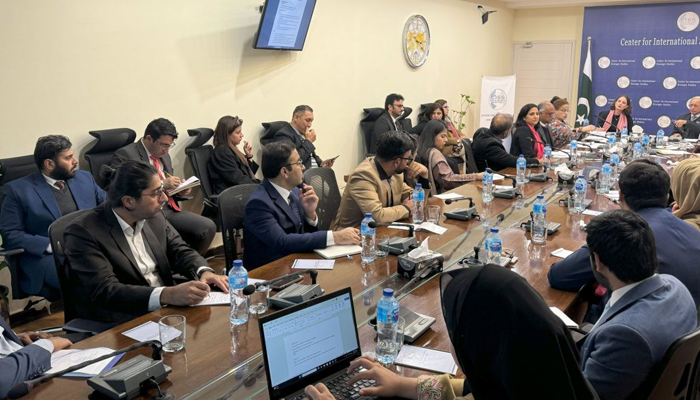‘Traditional South Asian crisis management approach inadequate’
Islamabad: Dr. Elizabeth Threlkeld, an American academic, on Friday cautioned that crisis management between Pakistan and India was being constrained by technological advancements and the escalating US-China rivalry, raising specific concerns for the stability of already tense South Asian region, says a press release.
Dr. Threlkeld, director of the South Asia Program at the Stimson Centre, was speaking at a roundtable organised by Centre for International Strategic Studies (CISS), Islamabad. Think tank professionals, academics and foreign policy experts participated in the roundtable.
She described the global situation as a challenging and unpredictable game, marked by unclear rules, increasingly powerful tools, and outdated methods of dispute resolution.
The Stimson Centre Director argued that strategic chains were creating tensions, weapons and technologies were becoming more advanced and intricate, and a mutual understanding of redlines was lacking. Additionally, she pointed out that current crisis management and Confidence Building Measures (CBMs) were failing to keep pace with the unfolding geopolitical realities and crises globally.
Dr. Threlkeld noted that the traditional approach to crisis management in South Asia was becoming increasingly inadequate due to new challenges from rapid technological advancements and their unpredictable applications. She added that the deployment of Multiple Independently Targetable Reentry Vehicles (MIRVs), along with issues relating to strategic stability, the complexities of degradative authority, AI and other emerging technologies, were causing significant concerns. Furthermore, the shift in military doctrines from a state of recessed deterrence to active deterrence was also raising alarms in the region.
Dr. Threlkeld opined that India was unlikely to provide active military support against China on the Taiwan issue. Rather, she foresaw India’s involvement as more passive, aimed at contributing to the balance of power in the Indo-Pacific region through deterrence strategies and logistical support under several agreements. Dr. Asma Shakir Khawaja, Syed Muhammad Ali, Dr. Rizwana Abbassi, Dr. Atia Ali Kazmi and Ambassador (r) Ali Sarwar Naqvi also spoke on the occasion.
-
 Columbia University Sacks Staff Over Epstein Partner's ‘backdoor’ Admission
Columbia University Sacks Staff Over Epstein Partner's ‘backdoor’ Admission -
 Ozzy Osbourne's Family Struggles Behind Closed Doors
Ozzy Osbourne's Family Struggles Behind Closed Doors -
 Dua Lipa Claims Long-distance Relationship 'never Stops Being Hard'
Dua Lipa Claims Long-distance Relationship 'never Stops Being Hard' -
 BTS Moments Of Taylor Swift's 'Opalite' Music Video Unvieled: See Photos
BTS Moments Of Taylor Swift's 'Opalite' Music Video Unvieled: See Photos -
 Robin Windsor's Death: Kate Beckinsale Says It Was Preventable Tragedy
Robin Windsor's Death: Kate Beckinsale Says It Was Preventable Tragedy -
 Rachel Zoe Shares Update On Her Divorce From Rodger Berman
Rachel Zoe Shares Update On Her Divorce From Rodger Berman -
 Kim Kardashian Officially Takes Major Step In Romance With New Boyfriend Lewis Hamilton
Kim Kardashian Officially Takes Major Step In Romance With New Boyfriend Lewis Hamilton -
 YouTube Tests Limiting ‘All’ Notifications For Inactive Channel Subscribers
YouTube Tests Limiting ‘All’ Notifications For Inactive Channel Subscribers -
 'Isolated And Humiliated' Andrew Sparks New Fears At Palace
'Isolated And Humiliated' Andrew Sparks New Fears At Palace -
 Google Tests Refreshed Live Updates UI Ahead Of Android 17
Google Tests Refreshed Live Updates UI Ahead Of Android 17 -
 Ohio Daycare Worker 'stole $150k In Payroll Scam', Nearly Bankrupting Nursery
Ohio Daycare Worker 'stole $150k In Payroll Scam', Nearly Bankrupting Nursery -
 Michelle Yeoh Gets Honest About 'struggle' Of Asian Representation In Hollywood
Michelle Yeoh Gets Honest About 'struggle' Of Asian Representation In Hollywood -
 Slovak Fugitive Caught At Milano-Cortina Olympics To Watch Hockey
Slovak Fugitive Caught At Milano-Cortina Olympics To Watch Hockey -
 King Charles Receives Exciting News About Reunion With Archie, Lilibet
King Charles Receives Exciting News About Reunion With Archie, Lilibet -
 Nvidia Expands AI Infrastructure With Nevada Data Centre Lease
Nvidia Expands AI Infrastructure With Nevada Data Centre Lease -
 Royal Family Shares Princess Anne's Photos From Winter Olympics 2026
Royal Family Shares Princess Anne's Photos From Winter Olympics 2026




